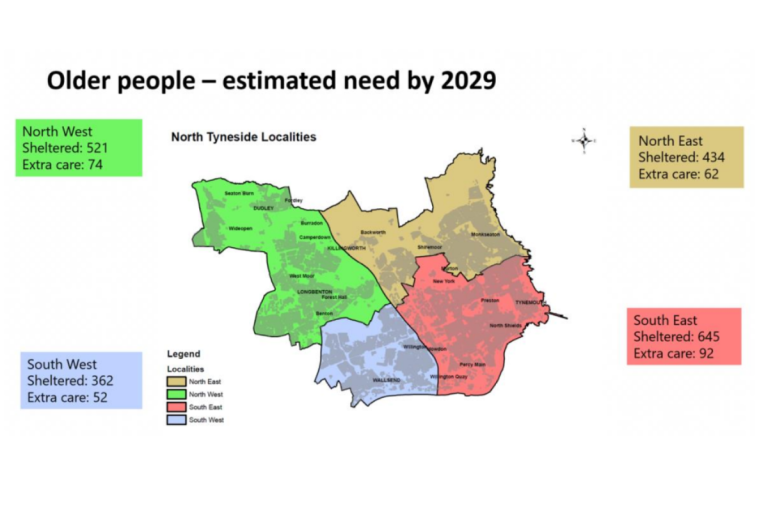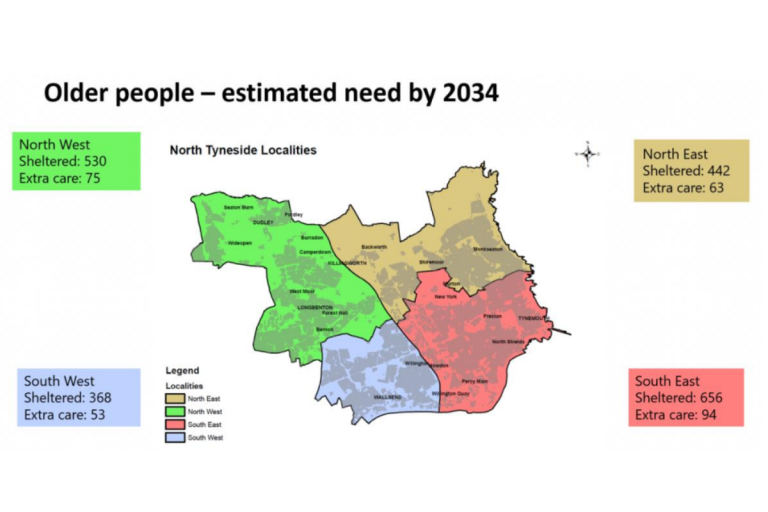Supported and specialist housing and accommodation for older persons
9.1 Headlines
- North Tyneside has an ageing population. Most significantly, North Tyneside’s population aged 75+ is projected to increase by c.25% between 2024 and 2034. This represents an increase of over c.5,200 older people in the 75+ age group. This increasing 'older old' cohort is likely to require additional provision of specialist housing/accommodation and care.
- The current prevalence rates of specialist housing in North Tyneside indicates:
- Higher provision of extra care housing compared to Chartered Institute of Public Finance and Accountancy (CIPFA) and national averages.
- Similar prevalence rates for retirement/sheltered housing compared with CIPFA and national averages.
- The majority of older people are living in homes that may not be suited to later life but wish to stay put rather than move.
- Some older people are willing and interested in moving to specialist housing provided it is attractive, affordable and accessible.
9.2 What local people are seeking
Older people are a diverse group with different views, experiences, and opportunities that influence where they might wish to live in later life. The range of housing types available needs to reflect this diversity.
A large proportion of older people have lived in their current home for a long time and as such many feel a sense of strong attachment to their home.
Qualitative research conducted in North Tyneside with older people suggests that many people are living in homes which are not suited to ageing, i.e. not accessibly designed, internal/external steps, inaccessible/upstairs bathrooms etc.
However, research conducted by Ipsos/the Housing LIN in 2023 indicates that most older people would prefer to remain living in their existing homes in later life than move.
But some older people are interested in and willing to move provided an alternative home is sufficiently attractive and meets their requirements. People are seeking properties that:
- Are in areas with good access to public transport, shops and amenities.
- Adapt to their changing needs in their later years.
- Provide good quality, affordable accommodation with less maintenance and upkeep requirements.
- Provide spacious, modern accommodation with a sense of community
For those that would prefer to move, the preference is to move to other ‘conventional’ rather than ‘specialist’ housing i.e. people are seeking to live in mainstream accommodation rather than sheltered/retirement or extra care housing. There is no desire to move to a care home.
Qualitative research with North Tyneside residents at Moorcroft sheltered housing and Rowan Croft extra care housing scheme, indicated that people had overwhelmingly positive experiences living there. The qualitative evidence locally and nationally indicates people value a range of features within specialist housing for older people including:
- Having access to staff and technology to support independence.
- Feeling safe and secure.
- The sense of community.
- The availability of communal space to socialise.
- Living in homes that are more manageable and designed for age-related needs.
Local evidence suggests that most people still tend to move to specialist housing at a point of crisis rather than as part of a planned proactive move.
More people might consider moving to specialist accommodation if it is affordable, aspirational, and accessible and meets the requirements summarised above. The affordability of specialist housing options was a significant consideration for local older people, particularly amongst homeowners on middle- and low-incomes. This indicates a need to demonstrate the cost benefit of specialist housing options but also for an affordable specialist housing offer.
9.3 Housing and accommodation priorities
The Council has a vision of providing high quality homes that meet the needs and requirements of all residents, including older people.
In relation to specialist housing, there are several extra care housing schemes in North Tyneside, including two new ones that opened in 2022. These offer a real alternative to both care home and home care services, but they also face difficulties with staffing and meeting demand. The Council aims to fully utilise the extra care provision and prioritise it for people with an assessed care need.
The Council’s strategy is to support the development of, and access to, extra care housing provision as an alternative to residential care. This could be about delaying the need for a move into a care home or as a direct alternative.
There are 11 extra care housing schemes in operation across North Tyneside, they are operated by 7 different landlords and the care and support is commissioned from 3 different CQC registered care providers. In total there are 480 apartments with one of the schemes (providing 40 apartments) offering extra care specifically for people with dementia.
There are currently 30 care homes for older people in North Tyneside, with 1,474 beds and 90% occupancy. The quality-of-service provision is good, but there are challenges with recruitment and retention of staff, rising costs, and changes in demand. The Council aims to reduce long term and short-term placements into care homes and support people to remain at home with the right levels of support or be supported to move into extra care rather than a care home.
9.4 Evidence of need and the Council's commissioning intentions
In summary, with respect to the estimated need for specialist housing and accommodation for older people:
Retirement/sheltered housing
The estimated additional need to 2034 is 1,996 homes of which 898 homes are estimated to be required for social/affordable rent (including potentially shared ownership options) and 1,098 are estimated to be required for open market sale.
Extra care housing
The estimated additional need to 2034 is 285 homes of which 128 homes are estimated to be required for social/affordable rent (including potentially shared ownership options) and 157 homes are estimated to be required for open market sale.
The map below indicates the estimated need by North Tyneside Locality by 2029 and 2034.


The Council expects to commission additional extra care housing schemes with social landlords towards meeting this identified need over the period to 2034.
The Council will work with social landlords and market housing developers to facilitate the development of modern retirement/sheltered homes and extra care housing for people who wish to purchase.
This will meet the housing and care needs of older people who are self-funders as well as older people who need rented accommodation and are eligible for social care funded by the Council.
The evidence from the Council’s supported housing need assessment indicates that c.25% of the estimated need extra care housing should be suited to the needs of people living with dementia.
